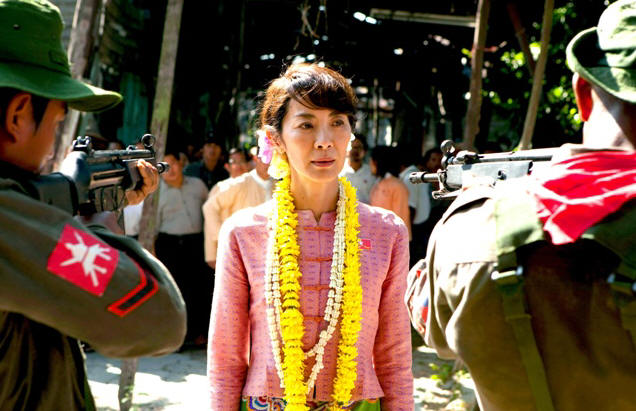MOVIE REVIEWS |
INTERVIEWS |
YOUTUBE |
NEWS
|
EDITORIALS | EVENTS |
AUDIO |
ESSAYS |
ARCHIVES |
CONTACT
|
PHOTOS |
COMING SOON|
EXAMINER.COM FILM ARTICLES
||HOME

Saturday, April 7, 2012
MOVIE REVIEW
The Lady
A Love Letter To A Real-Life Freedom Fighter In Burma

Michelle Yoah as political dissident and freedom fighter Aung San Suu Kyi in Luc
Besson's "The Lady".
Magali Bragard
by
Omar P.L. Moore/PopcornReel.com
 FOLLOW
FOLLOW
Saturday,
April 7,
2012
Luc Besson's "The Lady", which opens next weekend in the U.S. and
Canada, functions much more as a love story than a chronicle of freedom fighter
Aung San Suu Kyi and her political struggles against the bloodthirsty military
junta that ruled and murdered with an iron fist for decades in Burma. The
drama is based on many interviews with Suu Kyi's confidants, yet overall it
lacks substance and feels like a lavish, hollow spectacle of entertainment.
Michelle Yeoh portrays Burmese-born Suu Kyi, capturing some of the latter's
essence if not her gravitas and strength, but it's David Thewlis, in a fine if
acutely mannered performance as the writer Michael Aris, Suu Kyi's British
husband. Their relationship is the core of Mr. Besson's film, and for some
(like myself), the fact that "The Lady" (which should have been re-titled "The
Lady And The Gentleman") focuses mostly on the couple and their family as they
evolve over time amidst the title character's protracted fight for democracy and
liberation for the Burmese appears to cheapen and trivialize, if not
misrepresent Aung San Suu Kyi -- even if the depiction of her and Michael's
devoted love for each other is entirely accurate.
Throughout "The Lady" the camera gives us subtle and not-so-subtle winks and
nods at Michael, who winks and nods back. He is often more a center of the
film than Ms. Yeoh's character is. We are constantly reminded of his
presence. It's an excessively distracting device that pulls you out of the
story, and not least the brave, bold struggle of Suu Kyi, who was placed under
house arrest in the 1980s and served 15 years of that sentence over a
20-year-period. (Aung San Suu Kyi was released in 2010. Last week
she won a seat for her political party in the Burmese parliament in the
country's by-election.)
Like John Woo, Mr. Besson is a master of conjuring emotional resonance amidst
violent theater, particularly in his big screen heroines ("La Femme Nikita",
"The Professional"), doing so on an operatic scale. He cultivates a canvas
of cruel military violence and oppression of the Burmese people with
blood-splattered scenes. Only on sporadic occasions do we glimpse or learn
the political philosophies of Aung San Suu Kyi, and these are presented in
filler moments if not throwaway ones isolated and disconnected from the film in
general. The Burmese military, as brutal as they were, are presented at
times as a comedic punchline, caricatured for the audience rather than feared.
There are several wrinkles in Rebecca Frayn's screenplay, written over three
years. Ms. Yeoh portrays Suu Kyi as a dignified, calm and patient
figure of nobility. Yet there's a line she speaks towards the end of the
film which contradicts the patience and discipline Ms. Yeoh gives her.
"I'm not a patient person...", she says in part as she speaks to her husband.
It's bewildering and comical -- and it's not meant to be. Earlier in "The
Lady", Ms. Yeoh's character says to authorities, "I'll stay (in Burma) for
however long I choose." I understand the context, but still, the lines
spoken betray the character to an extent. At the risk of lawyering and
semantic trifling here, "however long" doesn't signal patience, even if it
personifies Suu Kyi's unwavering commitment to justice. Regrettably Mr.
Besson gives Suu Kyi surface treatment where the character's political
machinations are concerned. Sometimes Ms. Yeoh does as well. There's
a cutesy fuddy-duddiness about Mr. Thewlis's portrayal that, as gentle as it is,
becomes tiresome.
I feel that there was a calculation on the filmmaker's part to deemphasize
politics in order to craft a broader, universal love story as a source of
audience identification. Indeed, again, the love story -- a poignant and
sweet one pulsing with genuine affection -- is the endearing heart of
"The Lady", a film arguably seen from Michael's point of view. Yet in
romanticizing Aung San Suu Kyi for the big screen Mr. Besson underestimates the
knowledge of and worldwide admiration for a towering figure who has
non-violently achieved justice amidst violence in the same self-sacrificing way
that two giant 20th century figures -- Dr. Martin Luther King Jr. and Gandhi --
did. While watching "The Lady" I never once felt the core of this
inspirational lady, and Mr. Besson's film, which runs well over two hours, never
delivers anything close to it.
Originally rumored for a late 2011 release for Academy Awards contention but
pulled back, "The Lady", shown at the Mill Valley International Film Festival
last October with Ms. Yeoh and Mr. Besson in attendance, could and should have
been a far better film, even with its centerpiece love story. "The Lady"
misses a golden opportunity to entertain, engage and inform, wasting good
performances by Ms. Yeoh and Mr. Thewlis. It's too bad. The
potential was there, as are the sincere intentions, but the effort and endeavor
are wanting.
With: Jonathan Raggett, Jonathan Woodhouse, Susan Wooldridge, Benedict Wong.
"The Lady" is rated R by the Motion Picture Association Of America for
violence including some bloody images. The film has occasional English
language subtitles. The film's running time is two hours and 12 minutes.
COPYRIGHT 2012. POPCORNREEL.COM. ALL RIGHTS RESERVED.  FOLLOW
FOLLOW
MOVIE REVIEWS |
INTERVIEWS |
YOUTUBE |
NEWS
|
EDITORIALS | EVENTS |
AUDIO |
ESSAYS |
ARCHIVES |
CONTACT
| PHOTOS |
COMING SOON|
EXAMINER.COM FILM ARTICLES
||HOME

 FOLLOW
TWEET
FOLLOW
TWEET FOLLOW
FOLLOW